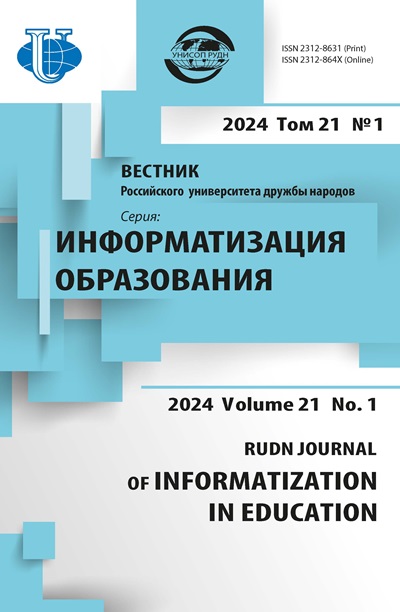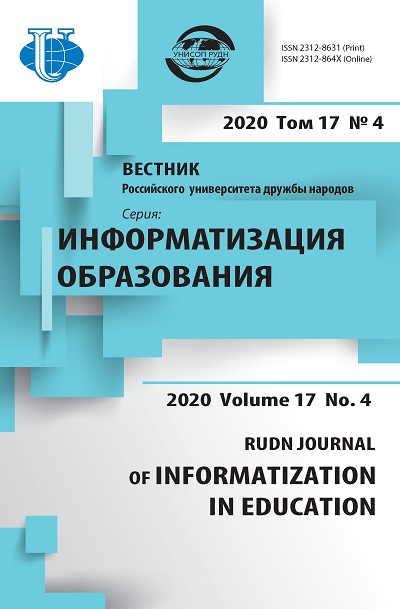Tools for distance learning and e-learning in communities of students and teachers: composition, usage and preferences
- Authors: Sergeev A.N.1
-
Affiliations:
- Volgograd State Social and Pedagogical University
- Issue: Vol 17, No 4 (2020)
- Pages: 323-336
- Section: DEVELOPMENT OF THE NET OF OPEN DISTANT EDUCATION
- URL: https://journals.rudn.ru/informatization-education/article/view/25391
- DOI: https://doi.org/10.22363/2312-8631-2020-17-4-323-336
Cite item
Full Text
Abstract
Problem and purpose . The article describes the issue of using e-learning and distance learning tools in the communities of students and teachers. The urgency of solving this issue is determined by the need to develop the digital educational environment that can be more or less focused on e-learning and distance learning. The goals of the research were to identify the degree of demand for distance and e-learning tools in the communities of students and teachers, as well as to establish the features of using the proposed tools in the conditions of their joint use. Methodology. In the course of the research the activities of students and teachers of the educational portal of the Volgograd State Social and Pedagogical University in the acade- mic year 2019-2020 were studied. The analysis presented the records of the facts and intensity of using distance (personal correspondence, posting the messages in the public space, presenting the tasks to the teacher) and e-learning (publishing the documents, developing e-course pages, doing self-check training tasks) tools. Based on the research results, teachers and students’ preferences in using e-learning and distance learning tools were determined, as well as features of joint use of tools. Results. The research has shown that there is a wide range of tools aimed at implementing both distance and e-learning technologies in Internet communities. The tools are quite independent from each other, which allows to build different learning strategies, more or less focused on e-learning and distance learning. Distance learning tools are in greater demand in terms of coverage, but e-learning tools are used more intensively. There is a significant difference in the ways the tools are used by teachers and students. At the same time, a considerable number of users combine different learning strategies, acting both as a teacher and a student. Conclusion. The data obtained in the research allow better understanding of the processes associated with the implementation of teaching in the Internet communities. Understanding the nature of these processes, possible strategies and behaviour preferences of teachers and students in the digital educational environment can become a basis for further development and improvement of online educational tools, as well as pedagogical technologies that are the basis for implementing educational activities on the Internet.
About the authors
Alexey N. Sergeev
Volgograd State Social and Pedagogical University
Author for correspondence.
Email: alexey-sergeev@yandex.ru
doctor of pedagogical sciences, associate professor, professor of the Department of Informatics and Methods of Teaching Informatics
27 Imeni V.I. Lenina Ave, Volgograd, 400066, Russian FederationReferences
- Kushnir M. Kak postroit' cifrovuju obrazovatel'nuju sredu [How to build the digital educational environment]. Available from: https://klever-ok.ru/2017/05/24/kushnir_ digital_edu/ (accessed: 05.07.2020).
- Gorjachenko EA. Internet-prostranstvo kak obrazovatel'naja sreda XXI veka [Internet space as the educational environment of the XXI century]. Setevoe obrazovatel'noe vzaimodejstvie v podgotovke pedagoga informacionnogo obshhestva [Network educational interaction in teacher training in the information society]: proceedings of the International scientific and practical conference. Vladivostok; 2019. p. 92–95.
- Lomachenko TI, Kokodej TA, Hitushhenko VV. Razrabotka modeli kompleksnogo funkcionirovanija kljuchevyh komponentov sovremennoj cifrovoj obrazovatel'noj sredy [Development of the model of complex functioning of the key components of the modern digital environment]. Vestnik Juzhno-Rossijskogo gosudarstvennogo tehnicheskogo universiteta (Novocherkasskogo politehnicheskogo instituta). Serija: Social'no-jekonomicheskie nauki [Bulletin of South Russian State Technical University (Novocherkassk Polytechnical Institute. Series: Socio-Economical Sciences]. 2019;(2):58–64.
- Nimatulaev MM, Cvetkova ON, Arutjunjan VV, Askerov AS, Homjakova VE. Internet-tehnologii v obrazovanii i kul'tura obshhenija v uslovijah telekommunikacii [Internet technologies in education and culture of communication in terms of telecommunication]. Obrazovatel'noe prostranstvo v informacionnuju jepohu [Educational space in the era of information]: collection of scientific papers of the International scientific and practical conference. Moscow: ISRO RAO Publ.; 2018. p. 599–609.
- Kolyhmatov VI. Obrazovanie budushhego: tehnologii cifrovizacii [Education of the future: technologies of digitalization]. Sovremennoe obrazovanie: soderzhanie, tehnologii, kachestvo [Modern education: contents, technologies, quality]. 2019;1:12–15.
- Shaljutina NV, Pjatibratov VE. Ispol'zovanie studentami obrazovatel'nyh onlajn-platform [Use of educational online-platforms by students]. Molodezh': aktual'nye social'nye praktiki [The youth: relevant social experiences]. Nizhny Novgorod; 2020. p. 112–125.
- Jakusheva NM. Jelektronnoe obuchenie: podhody k realizacii, primery sredstv obuchenija i uchebnyh zavedenij [E-learning: approaches to implementation, examples of learning tools and educational institutions]. Vestnik Moskovskogo gosudarstvennogo gumanitarnogo universiteta imeni M.A. Sholohova. Seriya: Pedagogika i psihologija [Bulletin of Moscow State University of Humanities named after M.A. Sholokhov. Series: Pedagogy and Psychology]. 2014;(1):84–88.
- Zilberman NN, Kulikov IA, Mozhaeva GV, Feshhenko AV. Perspektivy razvitija tehnologij jelektronnogo obuchenija: sistemy distancionnogo obuchenija ili social'nye seti? [Prospects of development of the technologies of e-learning: systems of distance learning or social networks?]. Luchshie praktiki jelektronnogo obuchenija [Best experiences of e-learning]: materials of the First methodological conference. Tomsk; 2015. p. 13–20.
- Kovalchuk SS, Garkusha NA, Medjankina EN, Muhina JuN. Onlajn-obuchenie: iz opyta zarubezhnyh i rossijskih vuzov [Online education: from the experience of foreign and Russian higher schools]. Vysshee obrazovanie segodnja [Higher education today]. 2020;(1):31–37.
- Medvedev DA, Kuznecova VS. Sistemy distancionnogo obuchenija v sovremennom obrazovanii [Systems of distant education in modern education]. Proryvnye nauchnye issledovanija: problemy, zakonomernosti, perspektivy [Breakthrough scientific research: issues, regulations, prospects]: collection of articles of the XIV International scientific and practical conference. Penza; 2020. p. 79–83.
- Feshhenko AV. Social'nye seti v obrazovanii: analiz opyta i perspektivy razvitija [Social networks in education: analysis of experience and prospects of development]. Gumanitarnaja informatika [Liberal informatics]. 2011;6:124–134.
- Volik MV, Milostivaja JuS. Ispol'zovanie social'nyh setej v obuchenii [Use of social networks in education]. Social'no-jekonomicheskoe razvitie regiona v uslovijah modernizacii [Socio-economic development of the region in terms of modernization]: materials of the All-Russian interuniversity scientific and practical conference of teachers and students. Vladikavkaz: Finansovyj universitet Publ.; 2015. p. 495–500.
- Angel OJu. Social'nye seti kak sredstvo obuchenija i vzaimodejstvija v obrazovatel'nom processe [Social networks as the means of teaching and interaction in the educational process]. Novye tehnologii v obrazovanii [New technologies in education]: collection of articles of the III International scientific and practical conference. Krasnoyarsk; 2015. p. 17–21.
- Sergeev AN. Opyt realizacii portala jelektronnogo obuchenija v social'noj obrazovatel'noj seti universiteta [Experience of e-learning educational portal in the social educational network of the university]. Informacionnye tehnologii v obrazovanii XXI veka [Information technologies in education of the XXI century]: collection of scientific papers of the International scientific and practical conference. Мoscow: MIFI Publ.; 2015. p. 76–82.
- Sergeev AN, Vydrych EI. Social'naja set' kak tehnicheskaja platforma distancionnoj podderzhki obuchajushhihsja v seti internet [Social network as the technical platform of distant support of students on the Internet]. European Social Science Journal [European Social Science Journal]. 2017;(11):324–329.
- Sergeev AN. Social'naja set' kak obrazovatel'nyj portal vuza: realizacija v obrazovatel'noj praktike teorii obuchenija v soobshhestvah Interneta [Social network as the educational portal of a higher school: implementation of education theory in educational experience in Internet communities]. Obrazovanie i obshhestvo [Education and Society]. 2018;3–4(110–111):72–75.
















